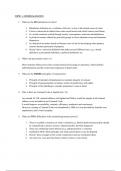Summary
Criminal Law Course Summary
- Module
- Criminal Law (LA10430)
- Institution
- The University Of Warwick (UoW)
Summary of key information needed for first year Criminal Law exam in 'question-answer' format to help with memorising/flash cards.
[Show more]



